United by Blood Money, Police States Stand Together
By Nicha Wachpanich [ text, pictures & video ]
BANGKOK, THAILAND // “Will the Singaporean Government stand for blood money – or clean business, with dignity?”
Adding strength to a chorus of voices from around the world, members of the Burmese diaspora stood in front of the Singapore embassy. Their demand: that Singapore stop selling arms used to kill their fellow citizens in Myanmar.
As at May 2023, Singapore was the third largest dealer of arms to the Myanmar military according to The Billion Dollar Death Trade reported by the UN Human Rights Office.
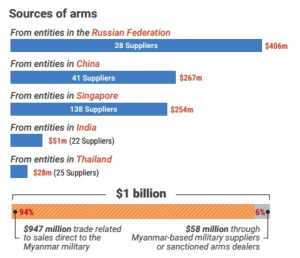
October 29th marks 1,000 days since the military coup d’état on February, 1st 2021 in Nay Pyi Daw.
4,160 deaths across the country have since been documented by AAPP-Burma.
In the preceding week, the “Blood Money Campaign” (BMC) led by the Burmese diaspora submitted an open letter to Singapore embassy representatives located in twenty-four countries. It called for sanctions to stop direct and indirect investments that allow for the transfer of arms to the Myanmar military.
“The UN Special Rapporteur on the situation of human rights in Myanmar recently revealed that Singapore is the third biggest supplier of arms and equipment to the Myanmar military since its coup attempt, in a trade valued at $254 million from at least 138 Singaporean companies,” said the open letter submitted by the BMC.
The letter was signed by more than 29,000 individuals and endorsed by local and international CSOs and organizations with the #DoMoreSingapore! and #NoMoreDirtyDeals hashtags.
According to the UN Report the main sources of arms to the Myanmar military, respectively, are: Russia, China, Singapore, India and Thailand. This materiel includes attack choppers, jet fuel, radar complexes, advanced missile systems, and a wide range of “dual use goods” – civilian items that can be used to suppress human rights when in the wrong hands, from chemicals to drones.
Thomas H. Andrews, UN Special Rapporteur on the situation of human rights in Myanmar, is clear on the matter, “If the Singapore Government were to stop all shipments and facilitation of arms and associated materials to the Myanmar military from its jurisdiction, the impact on the junta’s ability to commit war crimes would be significantly disrupted”.
“The Myanmar military and its arms dealers have figured out how to game the system. That’s because sanctions are not being adequately enforced and because arms dealers linked to the junta have been able to create shell companies to avoid them.
Andrews highlighted that no Member State has imposed sanctions on Myanma Foreign Trade Bank (MFTB) since the coup. “My findings demonstrate that MFTB is not only important for receiving foreign currency but is also being used extensively by the junta to purchase arms. It should be a prime target for international sanctions”.
In front of the Singapore embassy in Bangkok, eight Burmese protesters holding placards read the open letter aloud in Burmese. They had limited their demonstration in accordance with embassy requirements, but said that there were many more supporters residing in Thailand alone. [ See video above and pictures below]
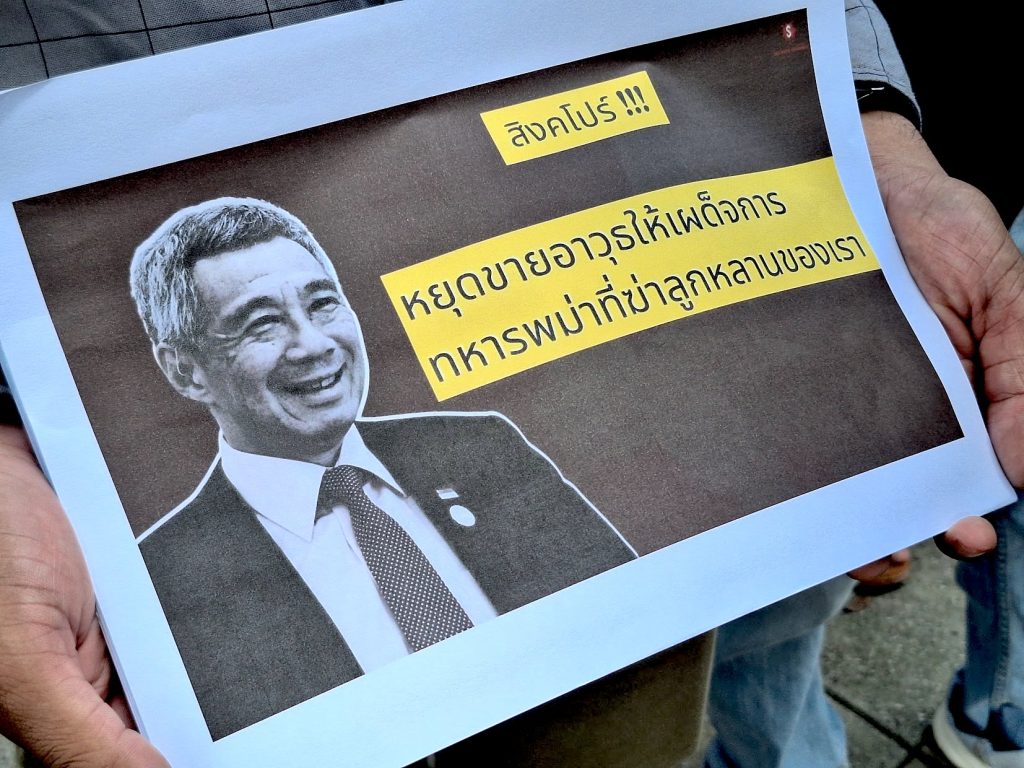
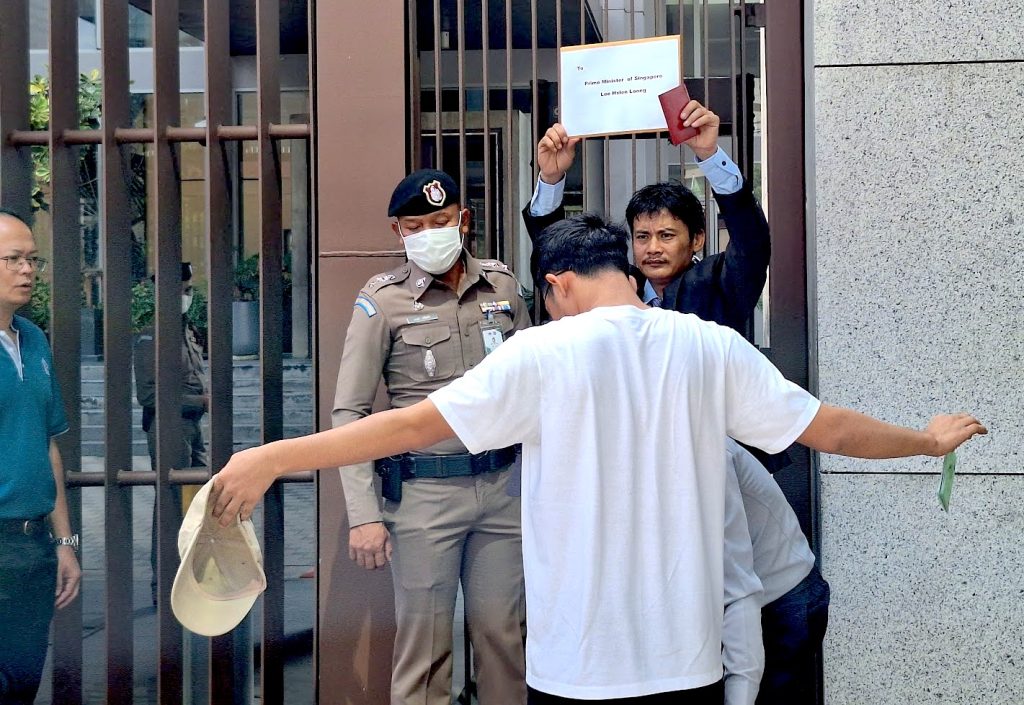
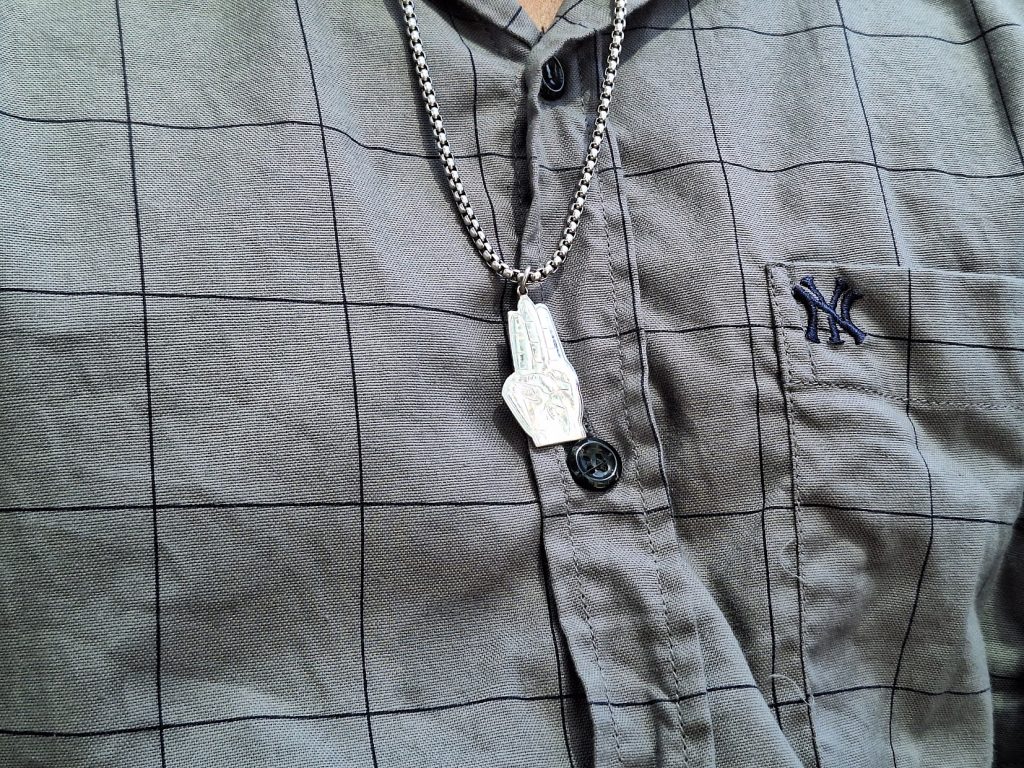
© A picture of Prime Minister Lee Hsien Loong and a message from Myanmar activists:
“Singapore!!! Stop selling weapons to the Myanmar junta who kills our children”
Shein Aung, a Blood Money Campaign representative and migrant worker in Thailand for many years, shared that whilst many Burmese people sought refuge in Thailand following the coup, the dream is to return home, and to have a better democratic society.
“We cannot even submit this letter to the Singapore embassy in Myanmar, as democratic action is no longer safe there.”
The 36-year old Bamar man added that amid the desperate actions the Burmese diaspora has taken to the international community, different countries have had different political standpoints on the Myanmar issue. In Thailand, his team also attempted to submit call-to-action letters to the embassies of China and India, but was denied the permission to do so.
The day after the protest took place in Singapore, Radio Free Asia reported that anti-coup activists in Singapore had had their passports unceremoniously cancelled. No official channels of communication appear to have been taken, with those affected finding out by surprise, some told by airport immigration officials that they were no longer in possession of a valid travel document. When attempts were made to contact the Myanmar embassy for clarification, embassy staff denied ever having received passport revocation orders. Other activists report that they have been directly questioned by the Singaporean police, suggesting tight cooperation between the junta in Myanmar and the Singaporean authorities.
==> Read this article on the People’s Action Party (PAP), which governs Singapore since 1959 thanks to a mix of pragmatism and authoritarianism (The Diplomat)
In Bangkok, activities of the Myanmar Spring Revolution have been monitored by local Thai police forces, including the Blood Money Campaign calling for clean money from Singapore as well as the action which took place on the same day in front of UN headquarters.
[ See pictures below © Courtesy of Prachatai ]
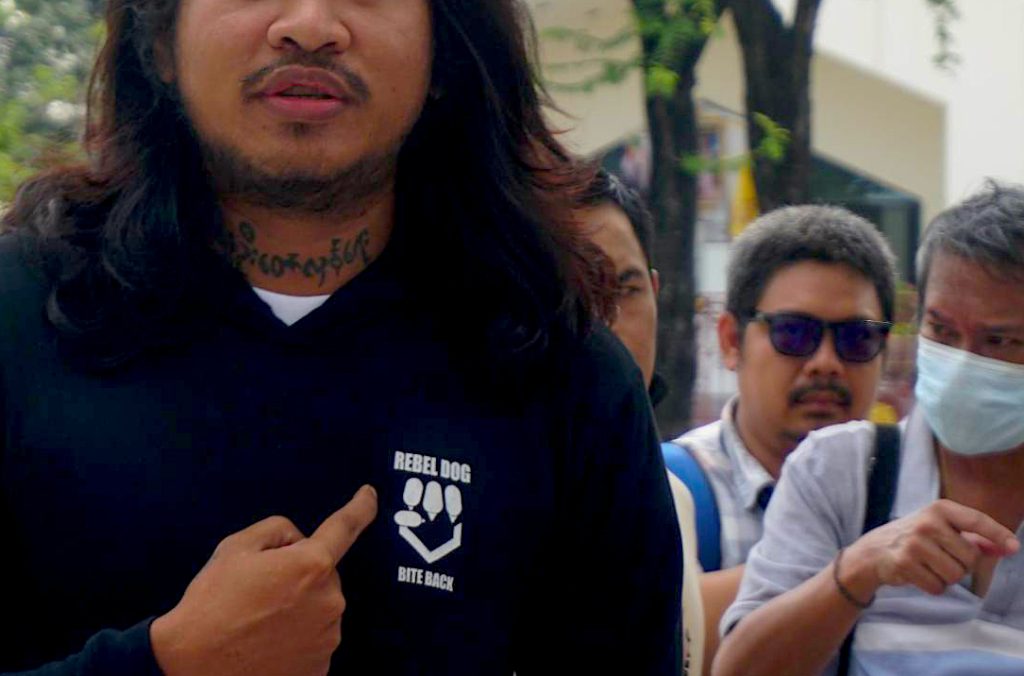
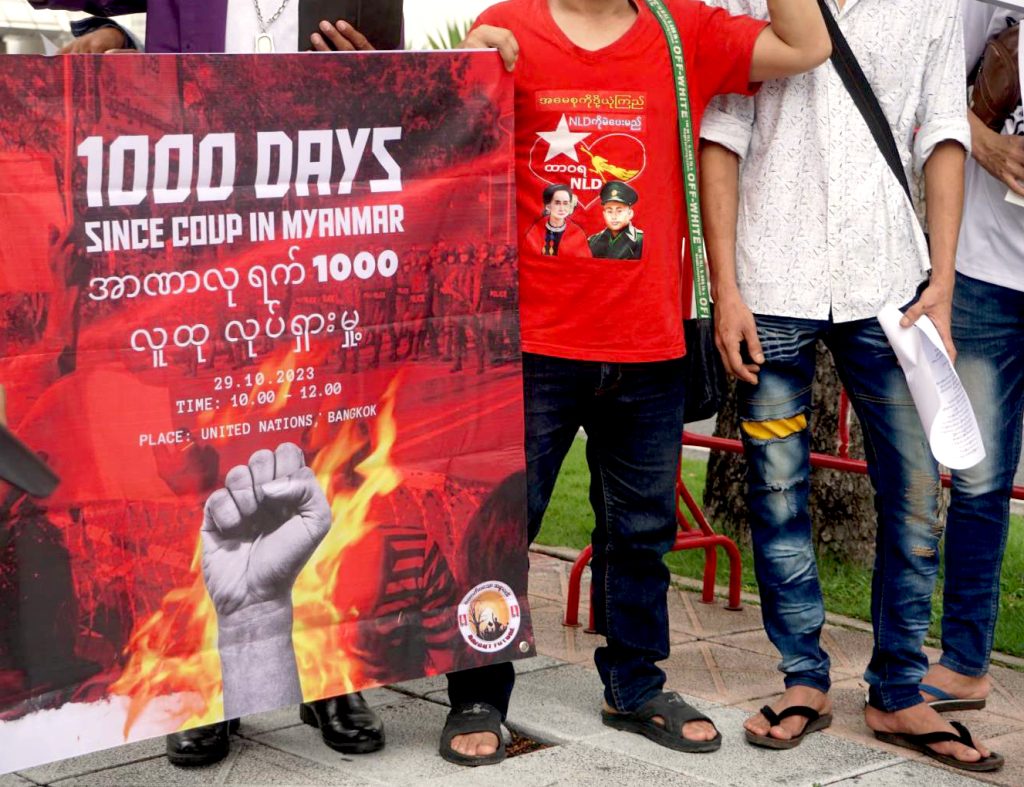
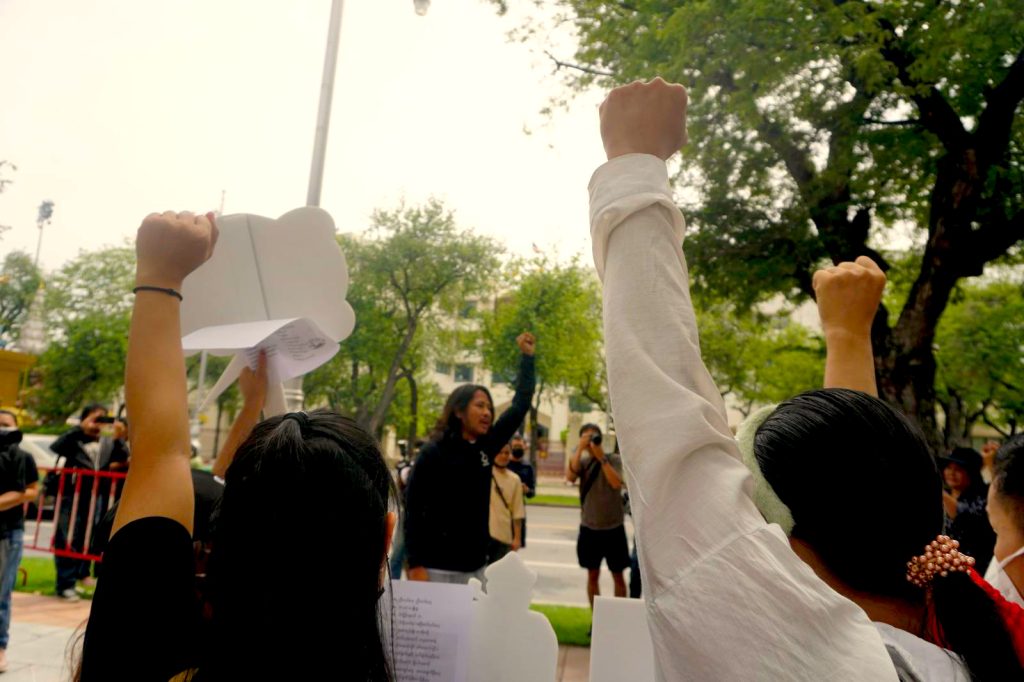
One of VR journalist, who was also present at the embassy protest, reports from behind the scenes:
“It started about 11:00 pm. About 15 uniformed Thai policemen stood on a public platform in front of the embassy. Another group of Thai-speaking men in casual suits chatted beside the platform. One wore a white T-Shirt with the word ‘SWAG’ printed in bold lettering. They were watching a group of Myanmar protesters: some held banners; some copies of the open letter; and some spoke with Thai journalists. Some wore masks to cover their faces.
The man in the SWAG T-shirt asked a protester to show him her passport, and then asked this of every foreigner in attendance. A Thai journalist explained this man to be a higher-ranking officer than those in uniform, and that his position mandated the inspection of passports. Five plainclothes police watched on from beside the platform, talking among themselves.
After the event, the young protesters ate a packaged lunch of rice, vegetables and minced meat that had been provided, and then walked to the street between the embassy and the Asia Center. Some of the policemen followed as they walked away.”